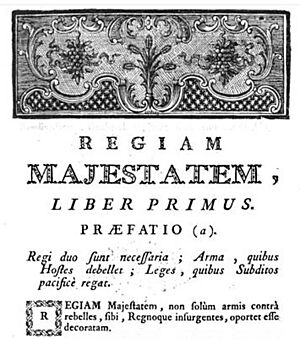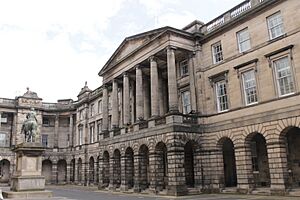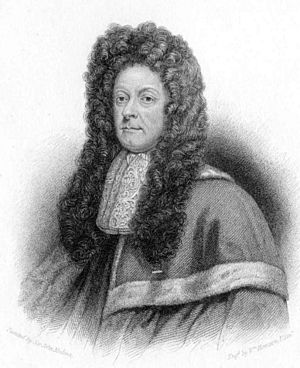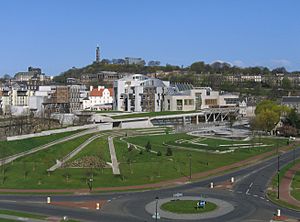Scots law facts for kids
Scots law is the special set of rules and laws that govern Scotland. It's a unique mix of different legal traditions, like a recipe with many ingredients! It's one of three main legal systems in the United Kingdom, alongside English law and Northern Irish law. Scots law gets its rules from four main places: laws made by parliaments, past court decisions, important books written by legal experts, and old customs. The Scottish Parliament makes laws for things like health and education, while the United Kingdom Parliament handles bigger topics like defense. Some very old laws from before 1707 are still used today!
Long ago, before the 12th century, Scotland had many different groups of people, each with their own ways of doing things and their own rules. These included the Gaels, Britons, Anglo-Saxons, and Norse people. Around the 12th century, a system called feudalism arrived. This helped create the modern foundations of Scots law. Over time, Scots law was shaped by ideas from other places, especially from Anglo-Norman and European legal traditions. Even ancient Roman law played a part, especially when there wasn't a clear Scottish rule for a problem.
After Scotland and England joined together in 1707 to form Great Britain, Scotland kept its own unique legal system. However, English law did start to have some influence. When the UK was part of the European Union, European laws also affected Scotland. Today, the Scottish Parliament makes many laws for Scotland, thanks to the devolution of powers. This means Scotland has its own parliament to decide on many important issues.
After the UK left the European Union, the Scottish Parliament passed a law in December 2020. This law, called the UK Withdrawal from the European Union (Continuity) (Scotland) Act 2020, helps Scottish Ministers keep Scotland's laws similar to European Union laws if they choose to, especially in areas where Scotland has its own powers.
Contents
Understanding Scots Law
The United Kingdom actually has three different legal areas: England and Wales, Scotland, and Northern Ireland. Each has its own legal system! Scots law is different from English and Northern Irish law in many ways, like how property is owned or how families are dealt with. But for some things, like business rules or consumer rights, the laws across the UK are quite similar.
Scotland's Unique Legal System
One interesting difference is the age when you can make your own legal decisions. In Scotland, it's 16, but in England and Wales, it's 18. Scots law also has its own unique ways of handling legal fairness, which is different from how 'equity' works in English law.
Here are some other differences in how serious cases are handled:
- In Scotland, juries for serious cases have 15 members, not 12 like in England and Wales. They make decisions by a simple majority.
- In Scotland, if you are accused of a serious matter, you don't get to choose if a judge or a jury hears your case.
- Scottish courts have a special third verdict called Not proven, besides "guilty" or "not guilty".
- For someone to be found responsible in a Scottish court, there usually needs to be at least two separate pieces of evidence that support the main facts.
Scotland has its own types of courts. Instead of magistrates' courts, there are justice of the peace courts and sheriff courts. For the most serious cases, Scotland has the High Court of Justiciary for criminal matters and the Court of Session for civil matters (disputes between people or groups).
Most legal cases in Scotland are handled by the Crown Office and Procurator Fiscal Service. This service decides if there's enough evidence to take a case to court. They also look into deaths that are unexpected or unexplained to understand what happened. Instead of a coroner's system, Scotland has Fatal Accident Inquiries (FAIs). A judge leads these inquiries to find out why a death happened and how to prevent similar events in the future. The Crown Office decides if an FAI is needed, unless it's a situation where one is always required, like a death that happened while someone was in official care.
Special Legal Words
In Scottish courts, the person or group starting a civil case (a dispute between people) is called a "pursuer". The person or group they are taking to court is called a "defender". Also, an item shown as evidence in court is called a "production", which is different from an "exhibit" in England and Wales.
The History of Scots Law
The story of Scots law goes way back! It started with different customs from Scotland's first cultures. Over time, it grew into the modern system we have today. Scots law is a mix of many things: old customs, feudal rules, church laws, European legal ideas, and even some English law. This blend makes it a truly unique legal system.
Early Beginnings
Before the 12th century, Scotland's laws were a mix of traditions from different groups like the Gaels, Welsh, Norse, and Anglo-Saxons. For example, some marriage customs in the Highlands were based on old Gaelic ways even in the 1600s. As the Kingdom of Scotland grew, it brought these different areas under one rule. This expansion, including adding the Outer Hebrides and Northern Isles, helped define the Scotland we know today and its legal boundaries.
Kings, Parliaments, and Courts

Starting in the 1100s, Feudalism slowly came to Scotland, changing how land was owned. This also led to the creation of early court systems, like the first Sheriff Courts. During the time of Robert the Bruce, the Parliament of Scotland became more important. It met more often and included more people from towns and smaller landholders. In 1399, it was decided that the King should hold parliament every year to make sure everyone was treated fairly by the law. In 1318, a special set of laws was made at Scone, focusing on important issues of the time, especially during the Wars of Scottish Independence.
By the 1300s, we start to see the first written legal books in Scotland, like the Regiam Majestatem. These books showed how courts worked and were influenced by Roman law. During the reigns of Kings James I and James V, the legal system became more organized. Lawyers started to appear, and the way justice was handled became more central. The Parliament of Scotland met yearly. The Court of Session, Scotland's main civil court today, also began to take shape around this time. In 1532, a special group of legal experts was formed, known as the College of Justice, to handle legal matters.
Union and Modern Changes
Important changes happened in 1689, giving more power to the Parliament in Scotland. Then, in 1707, Scotland and England joined to create the Kingdom of Great Britain. Even though the parliaments merged in London, the Acts of Union 1707 made sure Scotland kept its own legal system, courts, education, and church. This was a very important agreement that shaped Scotland's future.
After the Union, the new British Parliament could change laws for Scotland, but only if it was clearly good for Scottish people. During the Scottish Enlightenment, Scots law became a big subject taught at universities. As more laws were made in London, and some civil cases could be appealed to the House of Lords (now the Supreme Court of the United Kingdom), English law started to have more impact. To make sure Scottish law was understood, Scottish judges were eventually appointed to hear these appeals. Today, the UK Supreme Court always includes at least two Scottish judges when hearing cases from Scotland.
Scots law kept changing and growing in the 1900s. The biggest change came with devolution, which brought back the Scottish Parliament and gave Scotland more power over its own laws.
How Scots Law is Made
Laws from Parliament
Laws made by parliaments are a key source of Scots law. The United Kingdom Parliament can make laws for all of Scotland. However, it usually asks the Scottish Parliament for permission on matters where Scotland has its own powers. Important laws like the Human Rights Act 1998 and the Scotland Act 1998 have a special place. All new laws need the King's approval, which is usually a formality. The UK Parliament is very powerful, but it tries not to make laws that go against human rights. Sometimes, Parliament lets government ministers make smaller, detailed rules, which also become law.
The Scottish Parliament makes laws only for Scotland, on topics like health, education, and justice. These laws must follow the Human Rights Act 1998. If a Scottish law doesn't follow these rules, courts like the Court of Session can say it's not valid. For example, there was a challenge to a law about fox hunting, but the court upheld it. Like UK laws, Scottish laws also need the King's approval, which is automatically given.
Some very old laws from the Parliament of Scotland (before 1707) are still in use! For instance, a 1424 law says that gold and silver found in mines belong to the King. Another law from 1449 about property leases is still important in legal cases today.
It's important to remember that these laws are just one part of Scots law. They don't cover every single detail, as other sources of law are also very important.
Court Decisions and Common Law
Common law is another big part of Scots law. This means that past decisions made by judges in courts are used as guides for future cases. This is especially true for serious cases, where many rules come from these past decisions rather than written laws. Decisions from Scottish courts and the Supreme Court of the United Kingdom help build this common law. For serious cases in Scotland, the High Court of Justiciary is the highest court, so its decisions are very important. Decisions from the European Court of Human Rights also help shape how laws are understood.
It's important not to confuse Scottish common law with English common law, as they grew from different histories. Scottish common law started with the customs of various ancient Scottish cultures, mixed with feudal ideas by Scottish Kings. This created a unique legal tradition.
Sometimes, judges from England on the UK Supreme Court have influenced Scottish common law. This happened especially when laws needed to be similar across the whole UK. This could sometimes lead to different ways of understanding Scottish common law.
Important Legal Books
Important books written by legal experts, known as institutional writers, are another source of Scots law. These books, written centuries ago, explain many legal principles. Famous writers include Sir James Dalrymple, Viscount of Stair and John Erskine of Carnock. Their writings are still highly respected and used in courts today, almost like decisions from a high court.
Old Customs
Finally, old customs can also be a source of law. John Erskine of Carnock described custom as a rule that becomes law because everyone has followed it for a very long time. Today, customs are less common as a source of law, but some old traditions, like Udal law in Orkney and Shetland, still have a small influence. Mostly, their importance is historical.
Who Makes and Enforces Laws?
The Scottish Government
The Scottish Government is in charge of making plans and carrying out laws made by the Scottish Parliament. The First Minister leads the government and is chosen by the Scottish Parliament. The King then officially appoints them. The First Minister works with Cabinet Secretaries, who are like ministers for different areas, such as health or education. They also have legal advisors, the Lord Advocate and Solicitor General. Together, these people are called the "Scottish Ministers".
The Scottish Government looks after Scotland's legal system. The Cabinet Secretary for Justice and Home Affairs is the minister responsible for things like policing, courts, prisons, and emergency services.
The Scottish Parliament
The Scottish Parliament makes laws for many parts of life in Scotland. These are called "devolved" matters, meaning the power to make these laws has been given from the UK Parliament to the Scottish Parliament. This includes areas like health, education, and justice. However, some big topics, like defence and international relations are "reserved" for the United Kingdom Parliament in London. The Scottish Parliament also has some power to raise taxes. Even though the UK Parliament could technically make any law for Scotland, it usually respects the Scottish Parliament's decisions on devolved matters.
Scotland's Courts
Managing the Courts
The Scottish Courts and Tribunals Service manages almost all of Scotland's courts. This service is led by the Lord President of the Court of Session, who is the top judge in Scotland.
Civil Courts
Sheriff Courts handle many civil cases, which are disputes between people or groups. They deal with cases up to a value of £100,000. There's also a special Sheriff Personal Injury Court for cases about injuries, which can sometimes have a jury. If someone disagrees with a Sheriff Court decision, they can appeal to the Sheriff Appeal Court. For very important cases, appeals can even go to the Court of Session or, in rare situations, to the Supreme Court of the United Kingdom.
The Court of Session is Scotland's highest civil court. It handles complex or very valuable cases, especially those worth more than £100,000. Decisions made in one part of the Court of Session can be appealed to another part, and then, for very important matters, to the Supreme Court of the United Kingdom.
When cases involved European law, Scottish courts used to be able to ask the Court of Justice of the European Union for advice on how to interpret those laws.
Special Courts
Scotland also has special courts and tribunals for specific kinds of problems. These include Children's Hearings (which help young people), the Lands Tribunal for Scotland (for land disputes), and the Court of the Lord Lyon (which deals with heraldry and coats of arms).
Scotland's Judges
Scotland has different types of judges. The most senior judge is the Lord President of the Court of Session, who leads all Scottish judges. The next in line is the Lord Justice Clerk. Together with other senior judges called Senators, they form the College of Justice. These Senators are called "Lords of Council and Session" when sitting in civil cases and "Lords Commissioners of Justiciary" when sitting in serious cases.
Sheriff Courts are led by Sheriffs Principal, Sheriffs, and Summary Sheriffs. They handle both civil and serious cases.
The least senior judges are justices of the peace, who deal with less serious cases in Justice of the Peace Courts.
Legal Professionals
The legal profession in Scotland has two main types of lawyers: advocates and solicitors.
Advocates are like barristers in England. They are experts at speaking in court and giving legal advice. They usually get their cases from solicitors, but sometimes people can hire them directly. Senior advocates are called King's Counsel.
Solicitors work directly with clients on all kinds of legal matters. They often represent clients in court. Since 1992, some solicitors can get special training to appear in higher courts, becoming "solicitor advocates." Many solicitors are also notaries public, who can officially witness signatures on important documents.
The Scottish Law Agents Society (SLAS) is a group that supports solicitors in Scotland. It works to protect the independence of the legal profession and responds to new ideas for legal changes.
See also
- List of Scottish legal cases
 | Janet Taylor Pickett |
 | Synthia Saint James |
 | Howardena Pindell |
 | Faith Ringgold |







